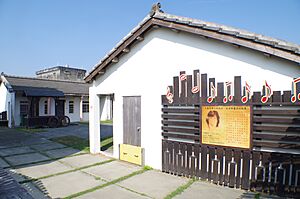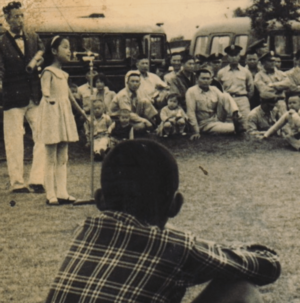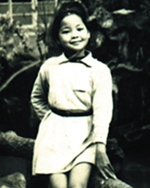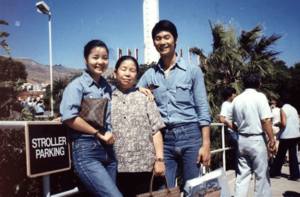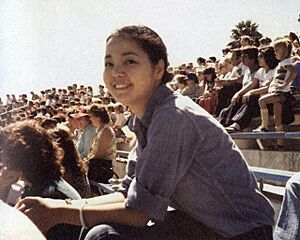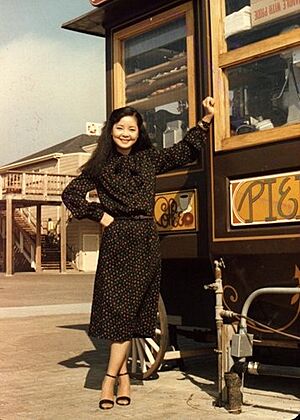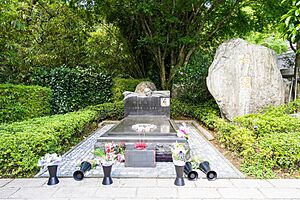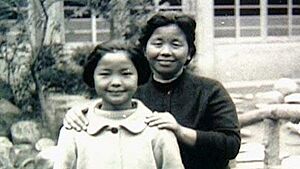Teresa Teng facts for kids
Quick facts for kids
Teresa Teng
|
|||||||||||||||||||||
|---|---|---|---|---|---|---|---|---|---|---|---|---|---|---|---|---|---|---|---|---|---|
| 鄧麗君 | |||||||||||||||||||||

Teng in 1979
|
|||||||||||||||||||||
| Born |
Teng Li-yun (鄧麗筠)
29 January 1953 Baozhong, Yunlin, Taiwan
|
||||||||||||||||||||
| Died | 8 May 1995 (aged 42) Chiang Mai, Thailand
|
||||||||||||||||||||
| Burial place | Chin Pao San, New Taipei City, Taiwan | ||||||||||||||||||||
| Nationality | Republic of China—Taiwan | ||||||||||||||||||||
| Education |
|
||||||||||||||||||||
| Occupation |
|
||||||||||||||||||||
| Years active | 1966–1995 | ||||||||||||||||||||
| Partner(s) | Paul Quilery (1989–1995) | ||||||||||||||||||||
| Awards | Golden Melody Awards – Special Award 1996 (awarded posthumously) |
||||||||||||||||||||
| Musical career | |||||||||||||||||||||
| Also known as |
|
||||||||||||||||||||
| Genres | |||||||||||||||||||||
| Labels |
|
||||||||||||||||||||
| Chinese name | |||||||||||||||||||||
| Traditional Chinese | 鄧麗君 | ||||||||||||||||||||
|
|||||||||||||||||||||
Teresa Teng (born Teng Li-chun; 29 January 1953 – 8 May 1995) was a super famous singer, actress, and helper of others from Taiwan. Many people called her the "Eternal Queen of Asian Pop." She is known as one of the most successful and important Asian pop singers ever.
Teresa Teng is seen as a huge cultural icon because of how much she changed Chinese pop music. People often say, "Wherever there are Chinese-speaking people, there is the music of Teresa Teng." She spoke many languages and had a clear, beautiful voice. Her emotional songs touched people across different countries, languages, and even political divides for decades.
Teresa Teng's career lasted almost 30 years. She was a very powerful and important artist in Asia, including East Asia, Southeast Asia, and parts of South Asia. Many believe she was the first pop superstar from the Far East and a pioneer of modern Chinese pop music. She helped the Chinese music industry grow by mixing Western and Eastern music styles. This helped create the modern Chinese popular music we know today.
Teng also helped connect different Chinese-speaking regions. She was one of the first artists to link Japan with parts of East and Southeast Asia by singing Japanese pop songs. In Taiwan, she was loved for performing for the armed forces and singing patriotic songs. People called her "the patriotic entertainer" and "the soldiers' sweetheart."
Teng recorded over 1,700 songs in her career, starting at age 14. She sang in Mandarin, Hokkien, Cantonese, Shanghainese, Japanese, Indonesian, English, and Italian. Many artists worldwide have covered her songs.
According to music statistics, Teng sold over 48 million albums, not including sales in mainland China. In 1986, Time magazine named her one of the seven greatest female singers in the world. In 2009, a Chinese government website asked people to vote for the "most influential cultural figure in China since 1949." Teresa Teng won with 8.5 million votes. In 2010, she was named "the most influential woman in modern China" in another poll. In 2022, a street in Ivry-sur-Seine, Grand Paris, France, was named after her. She was also added to the "Popular Music Hall of Fame" in Japan in 2007. She is the only non-Japanese person to receive this honor.
Contents
Teresa Teng's Early Life
Teresa Teng was born Teng Li-chun on 29 January 1953, in Baozhong, Yunlin County, Taiwan. Her parents were from mainland China and moved to Taiwan in 1949. Her birth name was often mispronounced, so she later used "Teng Li-jun" as her stage name.
She was the only daughter among five children. Her family was poor, and she grew up in military villages. Her father was a soldier who later sold cakes to support the family. Teresa went to Luzhou Elementary School in Taiwan.
Teresa loved music from a young age because her parents enjoyed it. Her father liked Peking opera, and her mother loved Huangmei opera. Her mother often took her to Chinese movies and opera houses. When she was six, Teresa started singing lessons with a friend of her father's who taught an air force band. She began singing for military audiences, a practice she continued throughout her life.
In 1964, Teresa won her first big prize. She sang "Visiting Yingtai" from the movie The Love Eterne. The next year, she went to Ginling Girls' High School. But because she was performing so much and her family needed money, she left school in her second year to become a professional singer. Soon, her singing helped support her family.
Her Amazing Career
Starting Her Music Journey
Teresa Teng's career began in 1967 when she hosted a TV show called One Star a Day. She also acted in TV shows and movies. At 14, she left school to focus on music. She signed with a record company called Yeu Jow Records. She started releasing albums with dance tunes and covers of Western pop songs, as well as local Taiwanese and Chinese folk songs.
To earn more money, Teresa sang in nightclubs around Taiwan. She performed for 70 days in a row at a fancy Taipei nightclub, singing for 90 minutes every day! Her albums sold very well. She got to record a theme song for Jingjing, Taiwan's first TV series, which made her even more famous.
In 1968, Teresa became truly famous after performing on a popular Taiwanese music show. This led to a record deal. She released several successful albums in Hong Kong. During these years, she had many hit songs like "Remembering Mama." She held concerts in Southeast Asia, attracting huge crowds. Her earnings from singing helped her family move into a comfortable home.
By the 1970s, Teresa's music style changed. She mixed pop and opera and added Western jazz to reach more people. Her popularity grew across Asia after she released albums in many languages. In 1979, she held her first concert in Vancouver, Canada. She then toured major US cities like San Francisco and Los Angeles. In 1980, she was invited to perform at Lincoln Center in New York and the Los Angeles Music Center. She was the first singer of Chinese background to be a main performer there.
When she returned to Taiwan, Teresa went on a Southeast Asian tour in 1981. She had 35,000 people attend her concert in Malaysia. She continued to hold big concerts in Hong Kong and Southeast Asia almost every year. In 1983, Teresa performed a series of very successful concerts in Las Vegas. Throughout her career, Teresa often gave free concerts to help people in need or raise money for charities. The money from these concerts went to help others.
Becoming Popular in Mainland China
For many years, mainland China was closed off from the rest of the world. Around 1974, Teresa's songs slowly started to reach mainland China through radios. In 1977, her song "The Moon Represents My Heart" was one of the first foreign songs to become known there. In 1978, as China opened up, cassette players and copied recordings of Teresa's songs began to spread across the country. Her popularity quickly exploded.
In Taiwan, Teresa's songs were used by the government to send messages to mainland China. Her songs were played loudly from speakers on Kinmen Island towards the mainland. In the early 1980s, because of political tension, her music was banned in mainland China. Authorities called it too "bourgeois" (fancy) and "corrupt."
But even with the ban, Teresa's songs were still heard. Fans bought pirated cassettes of her songs on the Black market, sometimes paying a month's rent for them. Her songs were played everywhere, from nightclubs to government buildings, and the ban was soon lifted. Teresa became almost as famous in mainland China as the country's leader. Fans called her "Little Deng" because she shared the same family name as leader Deng Xiaoping. There was a saying: "By day, everyone listened to 'old Deng' because they had to. At night, everyone listened to 'Little Teng' because they wanted to." Faced with her huge popularity, mainland China stopped restricting her music from the mid-1980s.
Light Exquisite Feeling and Her Views
Teresa's contract with Polydor ended in 1981. In 1983, she signed with Taurus Records and made a successful return to Japan. That same year, she released her most praised album, Dandan youqing, which means Light Exquisite Feeling. This album put 12 poems from the ancient Tang and Song dynasties to music, mixing old and new styles. It was her first album with all new songs, no covers. The most popular song from it was "Wishing We Last Forever".
Teresa felt a strong connection to mainland China, and she loved the classic Tang and Song poems. In a TV special, she said she wanted to help share "Chinese" culture. She hoped people would love these songs so that the treasures of China's 5000-year-old culture could be passed down through music. She wanted future generations to remember the joy, sadness, and pride of being Chinese.
The album was a big success, selling over 5 million copies across Asia. It became the best-selling Chinese music album by 2008. People and critics loved it, praising Teresa's amazing way of singing the old poems and bringing classical Chinese literature into popular music. It sold very well in Southeast Asia and went gold on its first day in Hong Kong. Experts called it "the finest work of the Chinese music circle." Teresa later planned to make a second album like this, but her health and other changes in music prevented her from doing so.
In 1987, Teresa released the Mandarin version of the album I Only Care About You. After that, because of her health, she mostly stopped performing and slowly began to retire.
Teresa performed in Paris during the 1989 Tiananmen student protests to support the students. On 27 May 1989, over 300,000 people attended the Concert for Democracy in China in Hong Kong. A highlight was her singing "My Home Is on the Other Side of the Mountain."
Even though Teresa performed in many countries, she never performed in mainland China. During a 1980 concert, when asked if she would, she said she would only perform there when the Three Principles of the People were put into practice. This meant when China became a democracy or reunited under Taiwan's government.
Success in Hong Kong
In 1975, Teresa worked with Polydor Records in Hong Kong. Her album Island Love Songs: Goodbye My Love (1975) won her an award and a chance to star in her own movie musical. The album won platinum at Hong Kong's first Golden Album Awards. In 1976, Teresa held her first Hong Kong concert, which was a huge success. She continued to perform in concerts for the next five years, always drawing big crowds.
Two years later, her albums Teresa Teng's Greatest Hits and Love Songs of the Island 3 won her another Golden Album Award. In 1980, Teresa released her first Cantonese album, Irreconcilable, which was the best-seller of the year. Its song, "Forget Him", became one of the most famous Cantonese pop songs. The album also received platinum. In 1982, her live concert album also went platinum. Teresa became a household name in Hong Kong.
Her second Cantonese album, Strolling Down the Road of Life (1983), was even more successful. It was her fifth album in a row to be awarded platinum, a record for any singer in Hong Kong. Teresa's popularity peaked by the end of 1983 with six sold-out concerts at the Hong Kong Coliseum. These concerts broke all sorts of Hong Kong records, with about 100,000 people attending. The concert series, called A Billion Applause Concert, celebrated her 15th year as a performer. A year later, she received a special medal for selling over five million copies in Hong Kong.
Popularity in Japan
Teresa entered the Japanese music market in 1973. On 1 March 1974, she released her first Japanese song, "No Matter Tonight or Tomorrow." This song didn't do very well at first. However, her second single, "Airport," released on 1 July 1974, sold 700,000 copies! She then released more successful songs like "The Night Ferry" and "Goodbye, My Love." In 1979, Teresa was caught using a passport that was not hers when entering Japan. She was sent back and banned from entering Japan for one year.
After a break, Teresa returned to Japan on 21 September 1983. She released her first comeback song, "Tsugunai" (Atonement), on 21 January 1984. This song also started slowly, but after a month, sales grew. Seven months later, "Tsugunai" reached eighth place on the Oricon Chart and first on the Japan Cable Broadcasting Chart. By the end of the year, it sold over 700,000 copies, eventually reaching a million. Teresa won the top award of 'Singer of the year' from the Japan Cable Award. "Tsugunai" was the most popular song and stayed on the chart for almost a year. This success broke all her previous sales records in Japan.
On 21 February 1985, Teresa's next song, "Aijin" (Lover), topped the charts in its first week. The song stayed at number one for 14 weeks and sold over 1.5 million copies. With "Aijin," Teresa won 'Singer of the year' for the second time. She was also invited to perform in Kōhaku Uta Gassen, a very important show for top Japanese performers.
Her next song, "Toki no Nagare ni Mi o Makase", released on 21 February 1986, also topped the charts. It sold 2.5 million copies in Asia, becoming one of Japan's most popular songs that year. Teresa won the Japan Cable Award for the third time in a row. She was invited to Kōhaku Uta Gassen again. Teresa became the first artist to win this top award three times in a row, and she is still the only foreign singer to do so in Japanese music history (1984–86). Teresa gave her last solo concert in Tokyo in 1985 before partly retiring from entertainment.
Singing for the Military in Taiwan
Teresa Teng was born into a military family in 1953. Her father served in the Republic of China Armed Forces. After the government moved to Taiwan in 1949, Teresa grew up in this military environment. Her first singing teacher introduced her to performing for soldiers, which she continued throughout her life.
She gave many performances for troops and sang patriotic songs on TV. In 1979, after the passport incident in Japan, she was allowed to return to Taiwan if she cooperated with the government. Teresa performed for Taiwanese troops again, and the money from her shows went to a fund for self-improvement and patriotism. In August 1981, she toured military sites all over Taiwan for a month, visiting generals and singing for them. These performances were shown on a TV special called Teresa Teng on the Frontline.
Because of her dedication to soldiers, Teresa was given the "Patriotic Entertainer" medal. The media nicknamed her "the soldiers' sweetheart." In the early 1990s, Teresa returned to entertain the troops again, with her last performance in 1994.
Helping Others Through Music
Teresa Teng started doing charity performances at a very young age. In 1968, she sang at a charity fair in Taipei to help people affected by an earthquake in the Philippines. The money raised was donated right away. The next year, the wife of the President of Singapore invited Teresa to a charity show. That same year, Teresa performed at another charity event in Singapore.
In 1971, she became the youngest person ever to be called the "Charity Queen" in Hong Kong for her charity sales. In 1973, Teresa participated in a charity gala in Singapore, giving four performances and raising $400,000 for student scholarships. She continued to perform for charity throughout the 1970s in Singapore, Taiwan, and Hong Kong.
In 1980, she raised over US$1 million for a hospital in Hong Kong and donated money from her Taiwan show to a national fund. In 1982, Teresa held a concert in Hong Kong, and the first earnings went to charity. In August, she donated money to build a water tower and drinking water system in a village in northern Thailand. In 1985, she held a solo concert in Tokyo, Japan, and the money was donated to charity. In 1991, she went to Hong Kong to help raise funds for disaster relief. Teresa gave her last performance in 1994 in Taiwan, a year before she passed away.
Her Unique Artistry
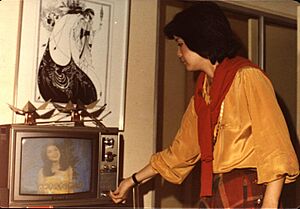
Musical Inspirations
Teresa Teng said that Chinese folk songs and music greatly influenced her career. She grew up listening to them often.
Her parents, who loved music, introduced her to different styles. She learned Peking opera from her father and Huangmei opera from her mother. Her mother even bought her songbooks to encourage her to sing in that style. Besides folk and regional music, Teresa was also influenced by shidaiqu (a type of Chinese popular music) and Japanese music.
Her Amazing Voice
Teresa Teng was a soprano singer, known for her "soothing and crystalline" (clear) singing voice. She had a wide vocal range. Her special singing style was described as a "quasi-whisper," which made listeners feel like she was singing just for them.
Experts praised her soft voice in high notes and her excellent breath control. They said her voice was "very distinctive, soft, and soothing," and that "you can't hear her breathing." Her voice could cover many different musical styles and languages. One expert noted that Teresa was "famously versatile," performing confidently in multiple languages and mixing different pop styles in her hit songs. Her voice and looks were seen as the perfect example of feminine beauty.
Writing Her Own Songs
In 1987, Teresa recorded "Summer Christmas," a cover of a Japanese song. The same year, she recorded "River of Destiny," also a cover of a Japanese song. She wrote the Mandarin lyrics for both songs and put them on her 1987 album, I Only Care About You. In 1988, Teresa wrote the lyrics for "We Are the Stars" in both Chinese and Japanese. She sang it on stage with Japanese musician Yūzō Kayama. In 1992, she wrote lyrics for a song called "Star's Wish," which was finished and released after she passed away.
Her Passing and Memorials
On 8 May 1995, Teresa Teng died suddenly while on holiday in Chiang Mai, Thailand, at age 42. Some reports said she had a severe asthma attack. Thai doctors said her death was due to heart failure, but no full examination was done. Teresa had complained about breathing problems since the beginning of the year. Her fiancé, Paul Quilery, was not with her when the attack happened. The cause of death was never fully confirmed because both families did not allow a full examination. The police closed the case due to lack of evidence.

Teresa's death caused a feeling of great loss across all of Asia. Her funeral in Taiwan was the largest state-sponsored funeral in the island's history, second only to that of leader Chiang Kai-shek. Over 200,000 people waited outside the funeral home to say goodbye, causing traffic in Taipei to stop. Her funeral was shown on TV stations in many Asian countries. Radio stations in Taiwan, China, and Hong Kong played only her music for two days.
Teresa was given special state honors at her funeral, with Taiwan's flag draped over her coffin. Many high-ranking officials and military leaders attended. A day of national mourning was declared, and President Lee Teng-hui was among the thousands present. Teresa received many top awards after her death. She was buried in a mountainside tomb at Chin Pao San, a cemetery in New Taipei City, Taiwan.
Her grave was named "Yun Yuan" after a character in her maiden name. The gravesite has a golden, life-size statue of her and a large electronic piano keyboard on the ground that visitors can play by stepping on the keys. Her tombstone has her head carved on it. The memorial is often visited by her fans.
In 1995, a tribute album called A Tribute to Teresa Teng was released, with famous Chinese rock bands covering her songs.
In 2002, a wax figure of Teresa was shown at Madame Tussauds Hong Kong. A house she bought in Hong Kong also became a popular place for fans to visit. Plans were made to sell the house to fund a museum in Shanghai, and it was sold for HK$32 million. It closed on what would have been her 51st birthday in 2004.
Her Lasting Impact
Throughout her 30-year career and even today, Teresa Teng is seen as one of the most celebrated and important figures in Asian music and popular culture. Her influence went beyond music, affecting both politics and culture in China. Her ability to sing in many languages made her an icon across Asia, starting the trend of region-wide pop superstardom we see today.
Cultural Influence

Teresa Teng became one of the biggest singers in the world in the 1970s and 1980s. Many consider her the most famous Asian pop star of her time.
Her deep influence on Asian popular music and Chinese culture led to her being recognized as the Far East's first pop superstar. Some say she was a pioneer of modern Chinese popular music, opening doors for future Chinese pop singers and inspiring many musicians.
Many famous people, both in music and other fields, have said Teresa Teng was their idol and a big influence on their work. These include singers Faye Wong and Jay Chou, fashion designer Vivienne Tam, and Nobel Prize winner Liu Xiaobo.
Impact in Mainland China
Before the 1980s, foreign music and art were mostly banned in mainland China. Love songs were almost non-existent, with mostly political songs promoting the government and military. One music critic said the music then was "overly masculine and lacking in femininity."
Teresa's music changed things. She mixed traditional Chinese folk music with Western pop and jazz. This opened the door for new music styles. Musicians started to learn from her, especially how to arrange music for pop songs. She also helped introduce the use of the saxophone in Chinese pop music. Her frequent use of jazz-influenced music set the standard for saxophone playing in Chinese pop today. Teresa also helped establish a "breath singing method," which was a new way of singing for Chinese popular music.
Teresa's songs were mostly about love and human relationships, which were missing from mainland culture at the time. In the early 1970s, as more people got radios, listening to Teresa's music became very popular. Author Ah Cheng remembered hearing her music for the first time in 1975. He said it was exciting and addictive, and he and his friends would press their ears to a radio to hear her voice.
The popularity of Teresa's music led to the birth of China's fan culture. Without modern technology, fans organized groups by sharing her tapes and discussing her music. This was the earliest stage of Chinese pop culture fandom. In 1977, her song "The Moon Represents My Heart" was one of the first foreign songs to become popular in China. Her songs over the next decade changed Chinese popular culture, marking the end of strict control by the communist party.
Author Ah Cheng said Teresa's songs inspired the return of popular culture in mainland China. Wu'erkaixi, a Chinese political commentator, said that young people who listened to her songs found a desire for freedom through her singing. He added that "to the Chinese, Deng Lijun was a great person. If Deng Xiaoping brought economic freedom to China, she brought liberation of the body and free thinking to China."
Nobel Peace Prize winner Liu Xiaobo said, "Teng's romantic songs reawakened our soft centers... melting our cold, unfeeling hearts, and liberating our long-suppressed human softness and tenderness." Filmmaker Jia Zhangke said Teresa's songs greatly inspired his interest in cinema. He explained that her songs were a huge change in China's culture at the time. Before the 1980s, China had no popular culture, only revolutionary operas. Everything was about the group, but Teresa's songs were new; they spoke to individual desires, changing everything.
Regarding her contribution to the music industry in China, one writer said, "Teng not only pioneered the development of popular music but also stimulated the rapid development of audio-video companies." Listening to tapes was a main cultural activity, and even though they were expensive, people still bought them. In 1979, there were only a few audio-video companies in China. By 1982, there were 300, showing how Teresa's music led this change.
Influence Beyond China
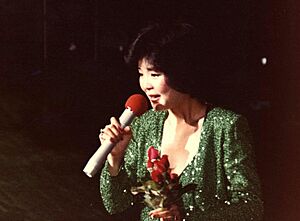
Teresa Teng became popular in Japan and Southeast Asia, and somewhat in South Asia. She gained a "cult status" in Hong Kong, Taiwan, mainland China, and Japan. She was one of the first artists to break through language and cultural barriers, gaining fame across many cultures that had been separate before. Hundreds of singers worldwide have covered her songs, including Faye Wong, Leslie Cheung, Jon Bon Jovi, and Kenny G. Her songs are also featured in many international films like Rush Hour 2 and Crazy Rich Asians.
In 1974, Teresa entered the Japanese market. She was very popular in Japan throughout the 1970s and 1980s. She recorded and performed Japanese pop songs, helping to connect Japan to much of East Asia, especially Taiwan, China, and parts of Southeast Asia.
An author from Nippon wrote that for Japanese people, Teresa Teng was more than just a singer. By performing Japanese pop, she connected Japan to its Asian neighbors. She taught them about the depth of Chinese culture.
In 2007, Teresa was added to the "Popular Music Hall of Fame" in Japan, making her the only non-Japanese person to receive this honor.
In 2015, on the 20th anniversary of her death, an article in Nikkei Asia said that Teresa, who is still loved across countries and ethnic groups, "still shines as a voice uniting Asia through song." In 2018, The Guardian wrote, "In 20th-century pop music, the voice of Elvis Presley is as iconic and identifiable in the west as that of Teresa Teng is in the east." Experts described her as "a model of inter-Asian modernity whose voice crossed linguistic, national and generational borders."
Awards and Recognitions

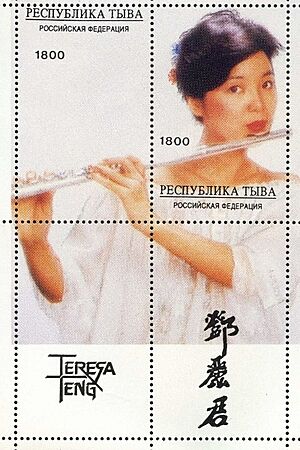
Teresa Teng was called a "brilliant linguist" by The New York Times. Time magazine named her one of the world's seven greatest female singers in 1986. In a 1997 survey in Japan, her song "Toki no Nagare ni Mi o Makase" was voted 16th among the 100 greatest Japanese songs. Her song The Moon Represents My Heart was ranked first among the 10 best Chinese classics of the 20th century in a 1999 poll.
In 2008, Teresa was the only singer chosen among China's 30 outstanding people in 30 years of reform. In 2009, she won an online poll for "The Most Influential Cultural Figure in China since 1949" with 8.5 million votes. In 2010, she was named "the most influential woman in modern China" in another poll. Her song The Moon Represents My Heart was ranked first among the 30 greatest Chinese musical works of the past 30 years by critics. That same year, CNN listed Teresa among the 20 most influential music artists of the past 50 years.
In 2011, Teresa's song "The Moon Represents My Heart" topped an online survey celebrating the 100th anniversary of the founding of the Republic of China. She was also ranked second on a list of top 10 Chinese celebrities who died young. In 2012, she was placed at No. 19 on a list of 50 most influential people in Taiwan in the last 400 years, making her the highest-ranked performer.
The 1996 Hong Kong film Comrades: Almost a Love Story features Teresa's story as part of its plot. The movie won best picture awards in Hong Kong, Taiwan, and the United States. In 2007, a Japanese drama series called Teresa Teng Monogatari was made to remember her.
In 2002, a statue of Teresa was put up in Shanghai. In Taiwan, a bronze statue was unveiled outside Luzhou metro station in 2011.
In 2015, a temple in Taiwan put up a statue of the singer, honoring her as "Miaoyun Bodhisattva." That same year, a "Lijun Town" was built in China dedicated to her. It has her ancestral home, a "Teresa Teng Hanging Garden," and an "Art Center" with her statue. Visitors can enjoy her music using artificial intelligence.
On 29 January 2018, a Google Doodle (a special Google logo) was released in many countries to honor Teresa on what would have been her 65th birthday.
Many countries around the world have issued postal stamps honoring Teresa Teng, including Papua New Guinea, Japan, and Russia.
Teresa Teng has a street named after her in Ivry-sur-Seine, Grand Paris, France. The city council voted to adopt the name on 17 February 2022.
Her Personal Life
Teresa Teng grew up Roman Catholic, like her grandmother. As a child, she often played around St. Joseph Catholic Church in Luzhou, where she was baptized. Later, Teresa became a Buddhist and spent her last six years living quietly in France.
In 1971, Teresa met her first boyfriend, Lin Zhenfa, a businessman from Malaysia. They fell in love, but he sadly died of a heart attack in 1978. Teresa later visited his grave with close friends.
In 1980, while in the US, Teresa met actor Jackie Chan. However, their personalities were different, and their relationship was short.
In 1982, Teresa was engaged to Beau Kuok, a Malaysian businessman. But his grandmother set conditions for their marriage, including that Teresa stop her singing career and share all her past relationships in writing. Teresa turned down the proposal, and the marriage was called off.
In 1990, Teresa met French photographer Paul Quilery in France. They dated for five years and got engaged a month before Teresa passed away on 8 May 1995.
Discography
Awards
Teresa Teng received many awards, including:
Japan:
- 1974: 16th Japan Record Awards: New Artist Award for "Kūkō"
- Japan Cable Awards: Grand Prix for "Tsugunai" (1984), "Aijin" (1985), and "Toki no Nagare ni Mi o Makase" (1986).
- 1986: 28th Japan Record Awards: Gold Award for "Toki no Nagare ni Mi o Makase."
- 1987: Japan Cable Awards: The Outstanding Star Award for "Wakare no Yokan."
- 1995: The Cable Radio Special Merit Award for her three Grand Prix wins.
Taiwan:
- 1980: 15th Golden Bell Awards: Best Female Singer
Hong Kong:
- 1978: RTHK Top 10 Gold Songs Awards for "Siu Cyun Zi Lyun"
- 1995: Golden Needle Award (given after her death)
See also
 In Spanish: Teresa Teng para niños
In Spanish: Teresa Teng para niños
 | William L. Dawson |
 | W. E. B. Du Bois |
 | Harry Belafonte |


